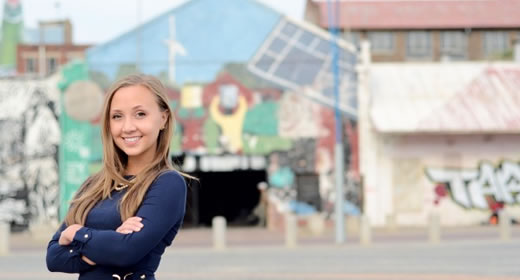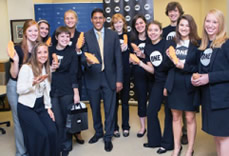
Madelynne Wager (BA '13), a first generation college student from the small town of Greenville, Mich., knew she wanted to make an impact. When she started her studies at the University of Michigan, she thought she could do that best by becoming a doctor. But during a summer medical internship in Venezuela, Wager became deeply troubled by the health disparities she witnessed between the wealthy patients at the region's spotless, upscale hospital, and what the poor confronted at the area's crowded, unkempt clinic. Why are poor people getting so much sicker in the first place, she wondered, and if poverty makes you vulnerable, can a living wage improve your health?
Wager soon shifted her attention to international economics. Her experience in Venezuela was a major catalyst, but there was another reason, too. She couldn't shake the memory of when Electrolux, the largest manufacturer in her hometown, moved its manufacturing operations to Mexico, removing 30 percent of her small town's tax base. "I saw the huge impact that it had on our town, and my friends, and their families," says Wager, who began to wonder if there were ways to help workers in developing countries without taking jobs away from families in developed ones.
As a public policy major and international economics minor, Wager worked with Alberto Trejos, a Towsley Foundation Policymaker in Residence at the Ford School, and Howard Stein, a professor of African and Afro-american Studies and a faculty associate with the Ford School's International Policy Center. She also joined the ONE campus challenge, lobbying Congressional representatives in Washington, DC to support proven USAID programs in developing nations. "That's when I began to see the policymaking process could be a way to systematically change things," says Wager.
Support students whose work will improve lives.
Later, Ford School financial support made it possible for Wager to undertake a prestigious DC-based fellowship with the Center for the Study of the Presidency and Congress, where she conducted advanced research on U.S. interventions to reduce poverty and inequality in Africa. Today, with some encouragement from Alberto Trejos, Wager is continuing that work far from her hometown, pursuing innovative solutions to extreme global poverty as the Machel-Mandela Fellow at South Africa's Brenthurst Foundation (where Trejos serves on the board).
 |
|
Wager (bottom left) and peers from U-M's ONE campus challenge met USAID Administrator Rajiv Shah (BS '95) at the Ford School. |
Wager's primary project at the Brenthurst Foundation is conducting research on inequality and how the private sector can help. "I think a lot of times, we look at governments as being both the culprit and the supposed hero of inequality," says Wager. But to Wager, an equally important conversation is the one that focuses on the imperative of private sector innovation to better the living standards of the billions currently excluded from the market system.
Below is a formatted version of this article from State & Hill, the magazine of the Ford School. View the entire Fall 2013 State & Hill here.